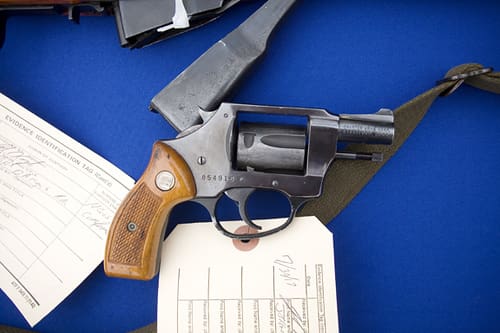We’ve already flagged Connecticut’s push to ban high-capacity firearms magazines from civilians (not law enforcement officers, manufacturers or gunsmiths). And now “Connecticut is considering legislation that could make it the first state to require convicted gun offenders to register where they live with law enforcement authorities.” officer.com reports that there’s a key difference. “Unlike sex-offender registries, which are public information, the proposed gun-offender registry [a.k.a., GORA], now under review by the state General Assembly’s public safety committee, would be accessible only by law enforcement.” The bill was introduced by New Haven State Senate Majority Leader Martin Looney. Swear to God. Apparently, he was inspired by his city’s crime wave . . .
Looney says his proposal was driven by the fact that gun-related deaths nearly doubled in New Haven, Connecticut’s second-largest city, from 12 in 2009 to 22 in 2010. He says the bill has support of senators in urban areas.
Aye! There be Democrats. Liberals. Gun grabbers. And plenty of parole officers, it must be said, who already have a database of felons released into the wild. But that’s not good enough for the senator.
Looney counters that the registry would not be redundant, because many offenders who are coming out of prison are not subject to oversight or review and are not easily traceable. He says the registry would target those who are near the end of their sentences and those who have had their sentences suspended.
Unlike the NRA, GOA and other gun rights groups, I believe that people who’ve paid their debt to society should have their Constitutional rights restored: the right to vote, bear arms, everything. If the state doesn’t consider a felon safe to re-enter society with all their rights, then they shouldn’t let them back into society.
Those criminals who will re-offend with a firearm will be able to source a gun illegally anyway. The most obvious example: the two ex-cons who kidnapped, raped, tortured and killed Dr. Petit’s family were tooled-up. On the flip side, CT suspends gun rights for a range of non-violent criminal convictions, including narcotics possession. Forever.
In any case, redundant gun control laws decrease the efficiency of law enforcement, evoking the law of unintended consequences. For example, in New York City, police gun registry enforcers make home visits. As do parole officers. Or do they? Do they coordinate? Share intel? Who gets the bust? Hey, I know! How about we give this power to the ATF?
As Ralph says, the bigger the government, the more likely it is that they will abuse their power. There’s just no getting around that law.





Nutmeg State, don’t you already know where these people are? No? You gotta be
sh!tt!ng me.
Mixed feelings on this, but there could be an advantage to a database of those who are forbidden firearms (by some constitutional criteria)..
When law enforcement encounters an armed citizen, the database is checked, and if the citizen is not found in that database he is presumed to be law abiding, allowed to retain his firearm and be on his way (if no current crime is under examination.)
Now, we don’t need no stinkin’ concealed carry license nor a priori proof of law abiding status.
Of course it can be abused simply by mucking with the criteria for inclusion or even by simple incompetent administration.
Comments are closed.